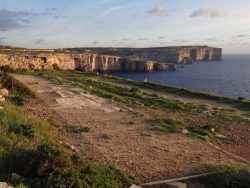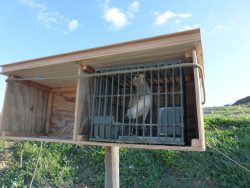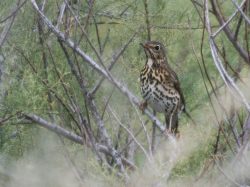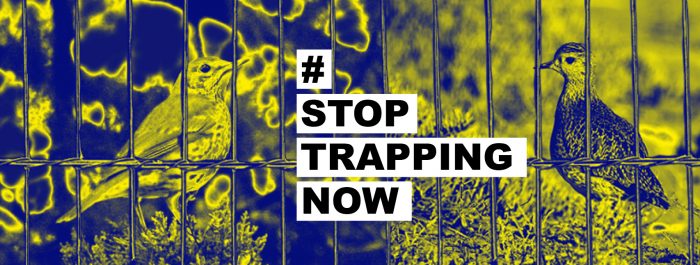The trapping season which opens tomorrow is a mistake. Trapping this year will only be permitted for Song Thrush and Golden Plover following June’s landmark European Court of Justice (ECJ) judgement which found Malta guilty of infringing the European Birds Directive when it allowed trapping for seven species of finch to reopen in 2014. The ECJ finch trapping verdict also sent an indirect message to the Government to halt the trapping season for Golden Plover and Song Thrush since the methods applied are the same as those applied to capture finches.
However in July, barely a month after the judgement of the European Court, the Ornis Committee adopted a proposal put forward by the hunting lobby and decided to recommend to government the opening of a trapping season for these two species. This is despite it being made clear that the ECJ ruling on finch trapping has direct implications on the trapping of any other species, and also despite the fact the Golden Plover and Song Thrush derogation already is the subject of Infringement Proceedings initiated by the European Commission (EC) in 2011. In view of all this, the season which starts tomorrow and remains open until the end of the year, will therefore put Malta at risk of another EU court case.
Although being aware of this possibility, earlier this week, Parliamentary Secretary Clint Camilleri announced he was taking on board the Ornis recommendation and will open this year’s trapping season following what he described as an agreement reached with the European Commission. Asked with whom in Brussels was this agreement negotiated, the Government is still yet to reply.
In these circumstances, BirdLife Malta has written to the EC requesting more details. It is a known fact that the Commission never agrees deals on derogations with countries but only asks for justification after these are implemented.
-
Despite the Government’s statement that it has reached an agreement with the European Commission, nobody knows with whom negotiations were conducted
-
To think that 1,546 trappers will only catch the quota of 5,700 birds in two months and a half is a farce
-
Trapping of Golden Plover and Song Thrush is already subject to EU Infringement Procedures, risking another European Court case for Malta
While BirdLife Malta is satisfied that the Government will be respecting the ECJ decision on finch trapping – an issue which is now done and dusted – at this stage BirdLife Malta can only hope that the EC was not taken for a ride with promises by the Maltese Government that it can control the quotas and ensure they are not surpassed. To think that just over 1,500 trappers will only catch the quota of 5,700 birds in two months and a half is nothing short of a farce. The quotas for this season have been set at 700 Golden Plover and 5,000 Song Thrush.
It was during its last meeting on 10th October that the Ornis Committee – now led by its new chairman Dr Joseph Grech – was informed that for this season a total of 1,546 trappers applied for the special licence when applications were received between the 20th of August and the 5th of September. Whilst 977 applied to be able to trap both species, there were an additional 380 applications for Golden Plover trapping and a further 189 applications for the trapping of Song Thrush. In past years the total of trappers registered to trap these two bird species stood in the region of 1,200 which means that around 300 trappers who previously used to trap finches have now applied to trap Golden Plover and Song Thrush.
On the other hand, we welcome the decision that – following years of legal battles to have the list of trapping sites in Malta made public in which the case had to be taken to the Information and Data Protection Appeals Tribunal – the Wild Birds Regulation Unit (WBRU) has from this season published on its website the list of registered trapping sites and their locations.
During last Wednesday’s press conference, the Government announced what the new measures will be and today the Government has published the relevant legal notices. These include the use of a larger net mesh size (increased from 30mm to 45mm) to avoid the capture of smaller birds, something which still does not eliminate the unselective methodology highlighted as a risk by the European Court since other protected birds of the same size or larger than Golden Plover and Song Thrush could still be caught. Another new condition is that nets are removed or covered during the night and when the trapper leaves the site – a measure which the Environment and Resources Authority (ERA) was sceptical on whether it will be sufficient.
Following the ECJ judgement, even Malta’s Attorney General had identified various risks of opening a trapping season this year, amongst which he highlighted the European Court’s conclusion that the use of clap-nets is not a selective means of capture for two reasons: (i) they can catch other birds, and (ii) they can catch a number of birds higher than the permitted quotas. ERA had also expressed its concern over the amount of nets that will be utilised during the season, which the ECJ judgement had also identified as a source of bycatch.
Another change announced is in regard to the use of electronic bird callers which will now become illegal. Trapping sites which are found to contain illegal callers will be immediately taken off the register. Additionally, every trapper can now only register one site instead of two, with every station permitted to have a maximum of two nets.
All in all, BirdLife Malta is disappointed that once again the Government will permit Malta’s countryside, including public land and Natura 2000 sites, to be hijacked by 1,500 people whilst at the same time risking another European Court case. Everyone remembers what happened in the finch trapping case when the Hon. Roderick Galdes had said he had found the famous ‘loophole’ to derogate and eventually Malta lost the case at the Luxembourg court. The same will happen with this derogation.
The 2018 autumn trapping season will be open from the 20th of October 2018 to the 31st of December 2018 (both days included). During these days trapping is permitted every day of the season (weekends included) from two hours before sunrise to two hours after sunset. Any illegal activity during the upcoming trapping season should be reported immediately to the police on 119, and then to BirdLife Malta on 2134 7645/6 or on emergency (out of office hours) number 7925 5697, ideally with a GPS location and photos.
Find out more about trapping and the laws regulating the season on our website here. In this section you will also find a downloadable step-by-step guide on how to report illegal trapping to the police.
Read the Maltese version of the press release here. Click here for the government press release announcing this year’s autumn hunting season and here for the list of registered trapping sites and their locations together with a Google Map showing the 1,800 trapping sites all over Malta’s countryside.




